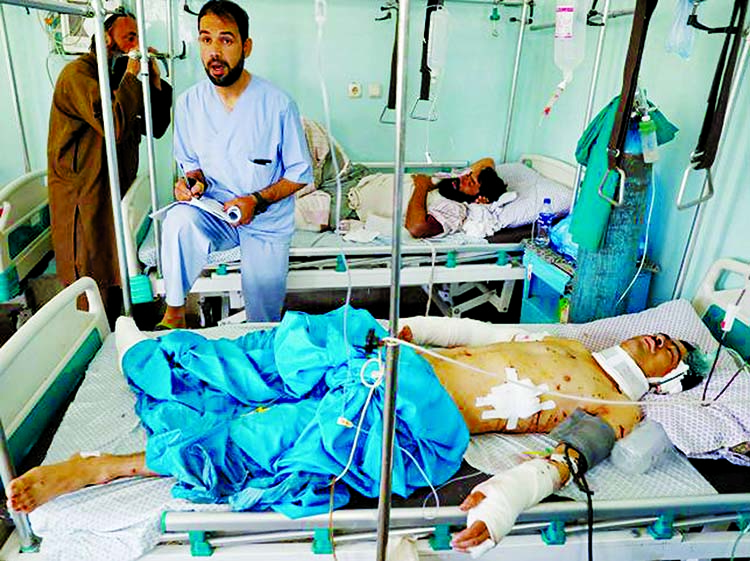
KABUL (Reuters) :
A suicide bomber killed 63 people and wounded 182 in an attack on a packed wedding reception in the Afghan capital, the interior ministry said on Sunday, as violence shows no sign of easing despite hopes for a deal on a U.S. troop withdrawal.
The Saturday night attack came as the Taliban and the United States are trying to negotiate an agreement on the withdrawal of U.S. forces in exchange for a Taliban commitment on security and peace talks with Afghanistan’s U.S.-backed government.
The Taliban denied responsibility and condemned the blast at a west Kabul wedding hall, in a minority Shi’ite neighborhood, packed with people celebrating a marriage. Women and children were among the casualties, interior ministry spokesman Nasrat Rahimi said, as families thronged to Kabul’s crowded cemeteries to lay loved-ones to rest.
President Ashraf Ghani said the militants could not escape blame for the “barbaric” attack.
“The Taliban cannot absolve themselves of blame for they provide platform for terrorists,” he said in a post on Twitter.
The blast follows a bomb attack on a mosque in Pakistan on Friday that killed a brother of Taliban leader Haibatullah Akhundzada. No one claimed responsibility for that blast, which killed four people and wounded about 20.
Pictures on social media from the scene of the Kabul blast showed bodies strewn amid overturned tables and chairs at the wedding hall, with dark blood stains on the carpet.
Both the bride and groom survived.
“I won’t ever be able to forget this however much I try,” the groom, identified as Mirwais, told the TOLOnews channel. He said his cousin and some friends had been killed.
“I can’t go to the funerals, I feel very weak … I know that this won’t be the last suffering for Afghans, the suffering will continue.”
The bride’s father told TOLOnews 14 members of his family were killed.
Wedding halls have become a big business in Kabul as the Afghan economy slowly picks up and families spend more on celebrations. Big, brightly lit halls now line some suburban streets of the city, and bombers have targeted them before.
At least 40 people were killed in a wedding-hall blast in Kabul in November.
Islamic State militants also operate in Afghanistan and have carried out bloody attacks in towns and cities, some aimed at members of the Shi’ite minority.
There has been no let-up in fighting and bomb attacks in Afghanistan over recent months despite the talks between the United States and the Taliban since late last year.
In the northern province of Balkh, 11 civilians were killed on Sunday when a roadside bomb blew up their van, police said.
The Taliban have been fighting to expel foreign forces and re-establish an Islamic state since they were ousted in October 2001, weeks after the Sept. 11 attacks on the United States.
Both U.S. negotiators and the Taliban have reported progress after eight rounds of talks since late last year. But some Afghans were skeptical about the effort, amid the carnage.
“Peace with whom? With those who bomb our weddings, schools, universities, offices and houses?” wrote Twitter user Rada Akba.
“Selling out this land and its people to those killers is sick and inhuman. History won’t forget this.”
Taliban officials said on Saturday the killing of the brother of their leader in a bomb attack in Pakistan would not derail the talks with the United States aimed at securing their long-cherished goal of getting foreign troops out.
U.S. President Donald Trump has made no secret of his desire for a U.S. pullout from Afghanistan and an end to America’s longest war. Top U.S. national security advisers briefed Trump on Friday on the negotiations.
The Afghan government has not been involved in the talks because the militants refuse to deal with an administration they see as a U.S. puppet.
There are concerns among Afghan officials and U.S. national security aides about the talks with fears Afghanistan could plunge into a new civil war that could see a return of Taliban rule and international militants finding a sanctuary.

